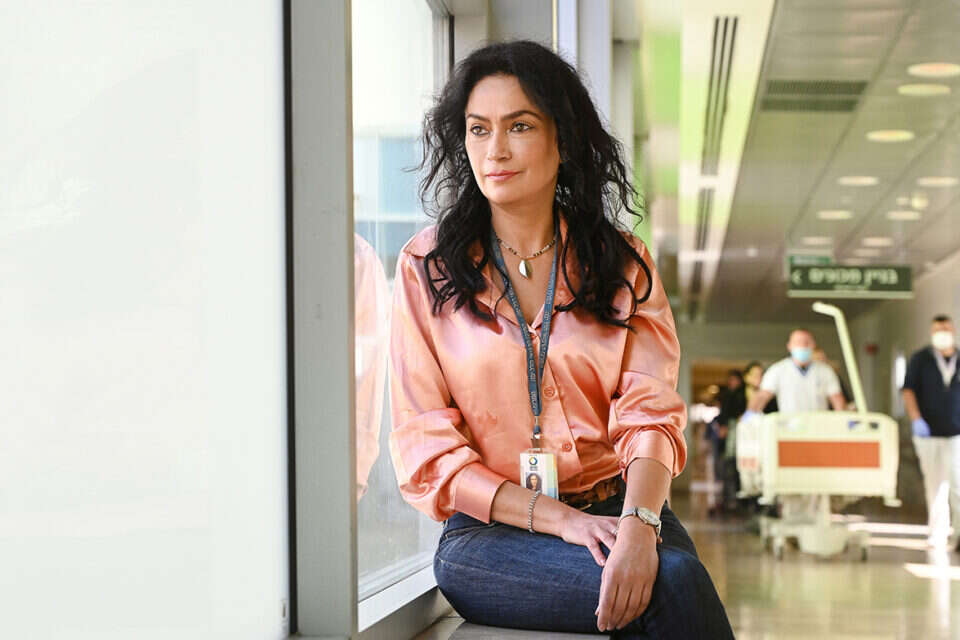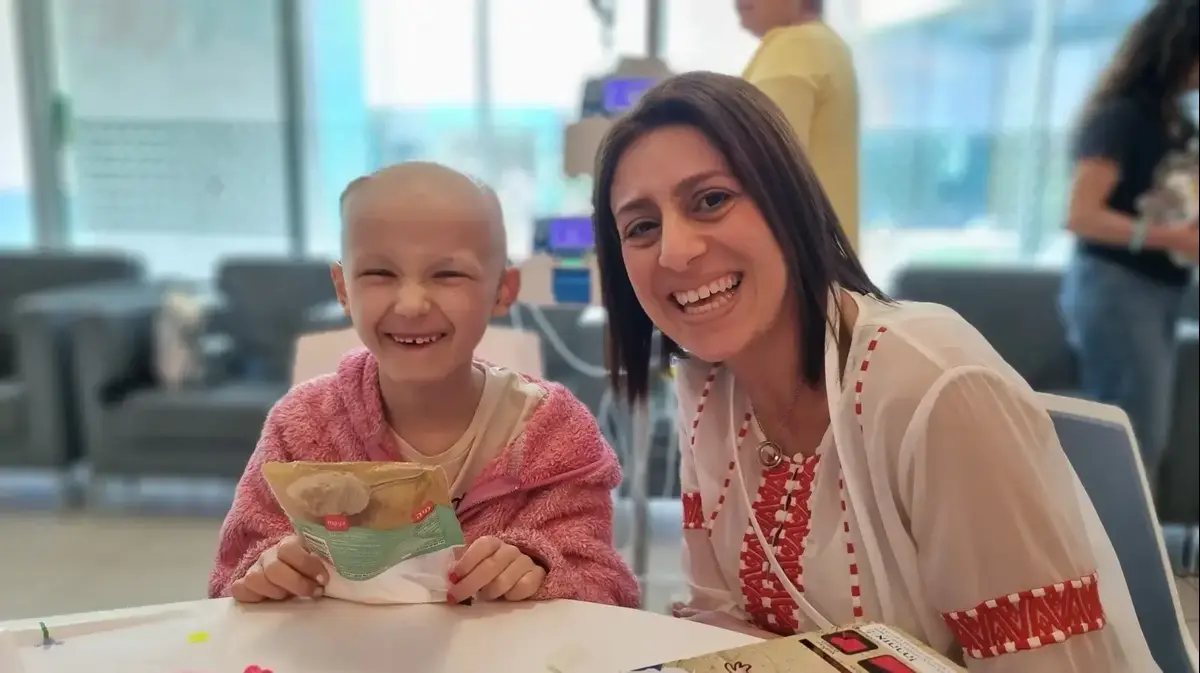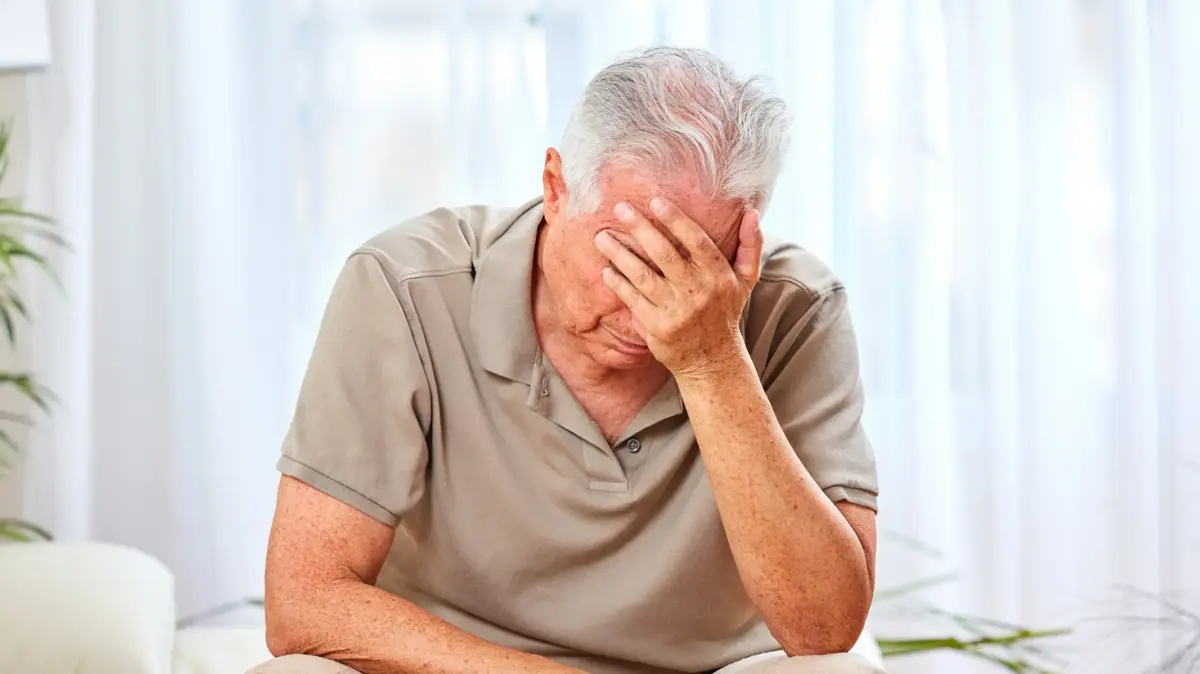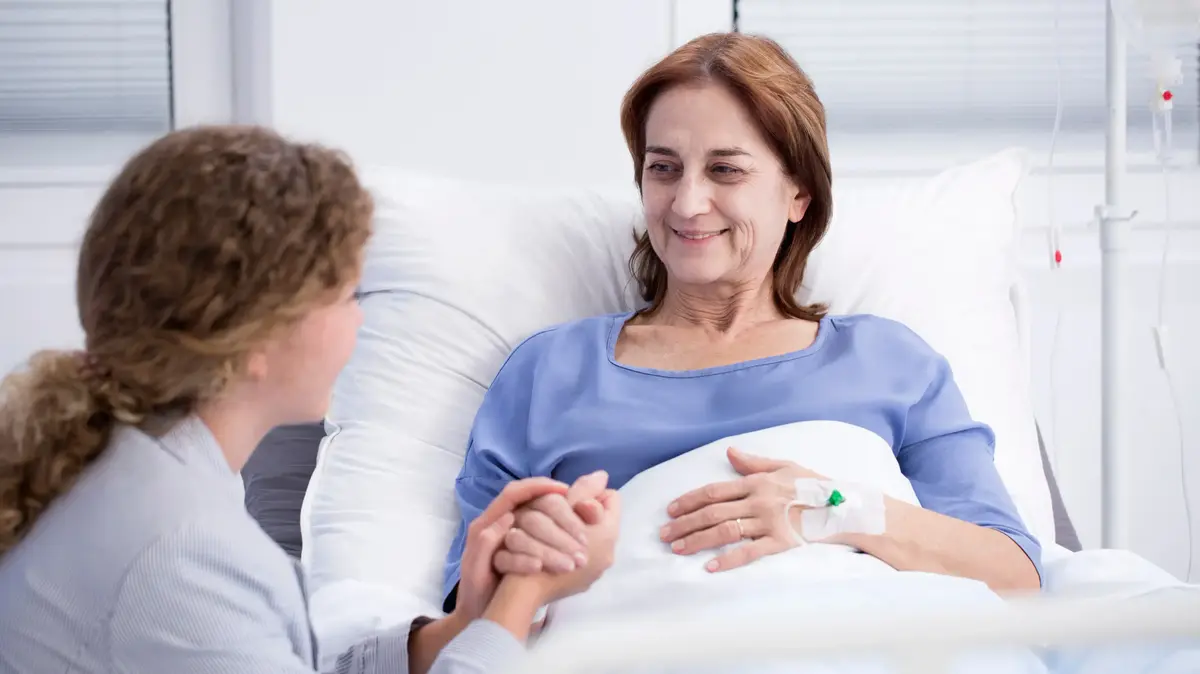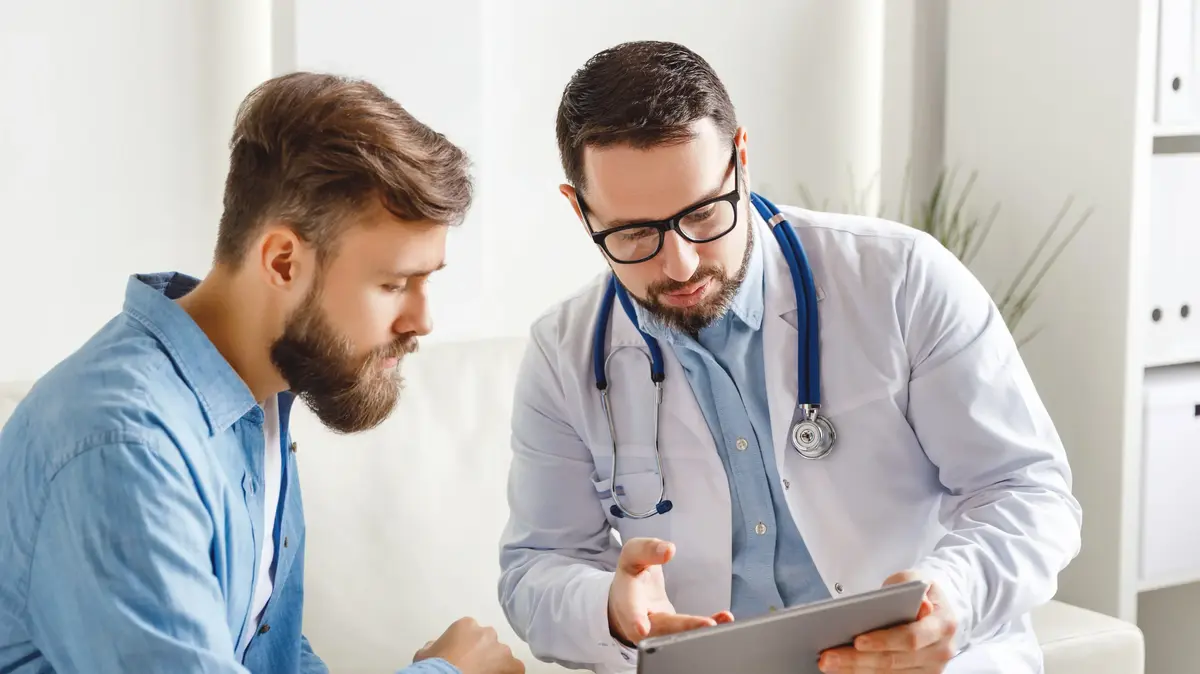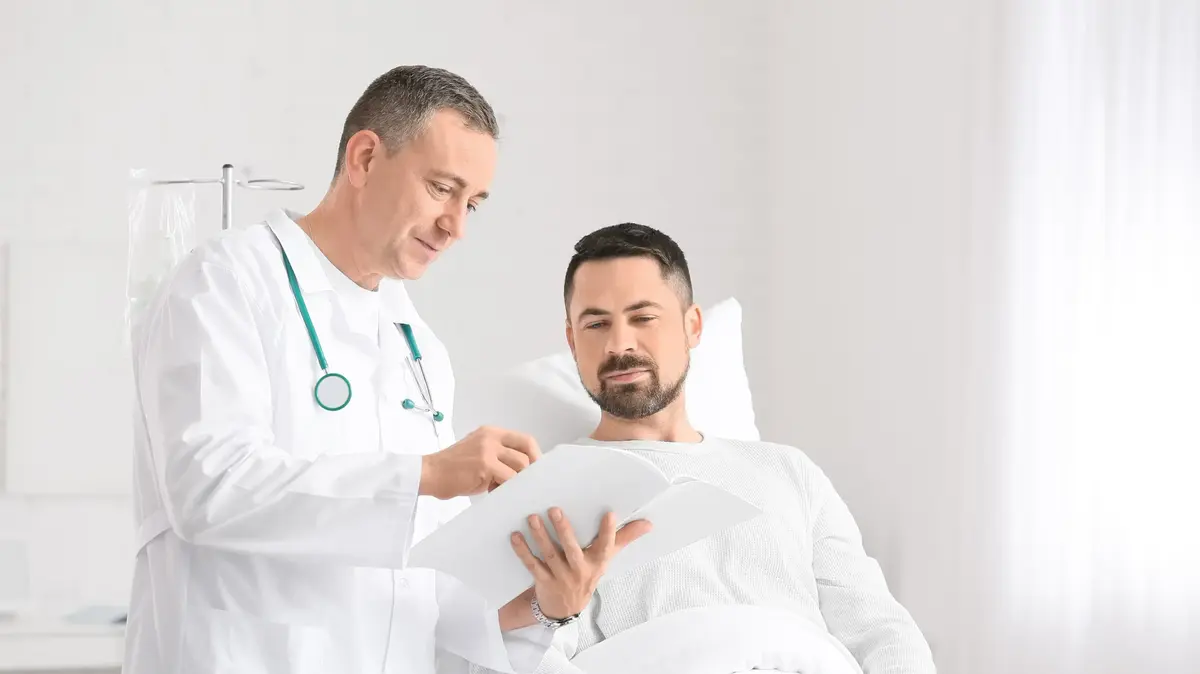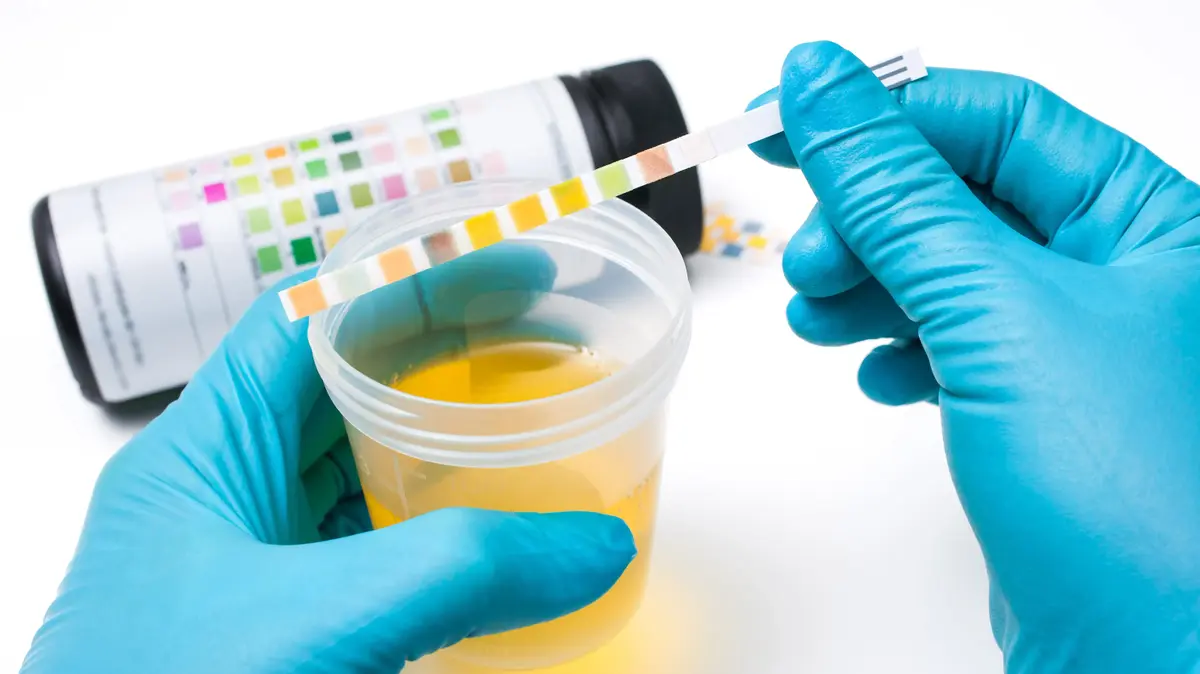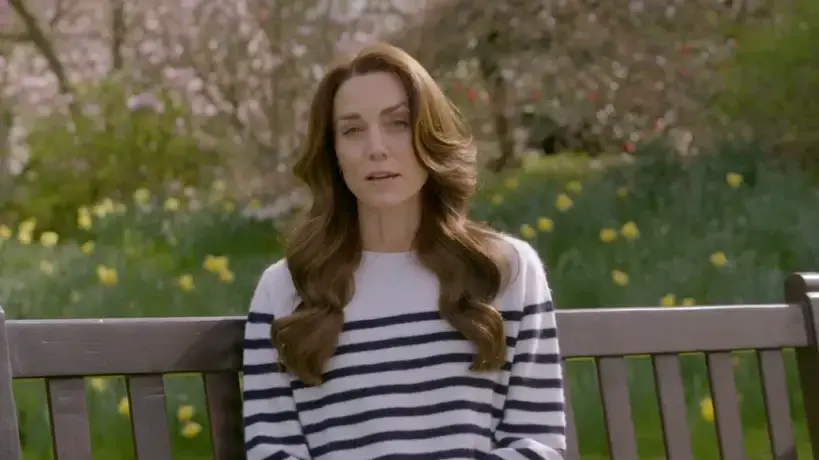One building, a five-minute walk away, separates Alina Fishenson's professional life from her private life.
One building that separates her office as the director of the social workers at Hillel Yaffe Hospital in Hadera, and the oncology ward where she is being treated, after last August she was found to be suffering from violent and widespread cancer.
"My specialization in trauma and stressful situations is very much in line with my personality and my lifestyle," she grins.
"After all, this is what I go through every day. Trauma and stressful situations."
At times, during the conversation, she succumbs to sadness.
These are the few moments where she allows her eyes to fill with tears, then sips from the water bottle on the table, changes the subject and tries to move on.
Fate wanted it, and Alina's clinical experience was also mixed with her life experience.
Fourteen years ago, her husband Vladimir was killed in a car accident, when their joint daughter, Liora, was 7 and a half years old.
Alina was then a social worker at Hillel Yaffe and cared for the families of road accident victims.
A few years later, both her parents were cared for in the oncology ward at Hillel Yaffe, while she was the social worker in charge of the ward. In families.
When she found out she was suffering from colon cancer, which also sent metastases to the liver, Alina decided to continue working in the ward and treat her illness - at the same time.
For eight months now she has been leaving the swivel chair in her office and the shelves laden with professional literature once every two weeks, and walking down the long corridors straight to the oncology ward.
The sun's rays paint the hallway in a caressing light, and Alina, dressed in jeans and a formal button-down shirt, moves to the row of brown leather sofas covered with a sheet, with the blue curtains separating them.
She gently exposes the "port" - a tube that is implanted under the skin and is used mainly for medication - and when the nurses attach the tube that transmits the drug to her, only then does she remember the disease.
"During the day, in my routine, I do not feel sick," she will tell later.
"I'm busy doing it. Only when I get up and go to the ward do I feel sick. It's amazing. When I arrive in the morning I go for tests, and then, in the office, I run as usual. I meet people, go through forms, and then this phone comes, when the girls call me. Get the treatment.
"And only at this moment, when I come and open the gate and connect it to the material, only then do I get the token of the disease. Every day I can escape from it. As long as I work and function and maintain a routine, the disease is only on paper. But when I sit here, on the couch I feel it's real. Here, the substance is dripping, and the disease has not escaped anywhere, and suddenly I'm in a very vulnerable place. ".
At the entrance to the oncology ward at Hillel Yaffe, the hospital where she works.
"Because of my experience, I have more sensitivity to oncology patients," Photo: Efrat Eshel
• • •
She is 48 years old, and today is in a relationship with Alexander Zibrov (50).
She was born in Ukraine, which she left at the age of 20 with her parents and then-husband, Vladimir.
Today she has no friends or family left in Ukraine, but her heart shrinks when she sees the great destruction that the brutal war there leaves behind in Kharkiv, the city where she grew up and studied.
"I studied there for a bachelor's degree in computer engineering, and every day I would pass by the big square on the way to university. It used to be the main square, crowded with shops and people. Today it is a wave of ruins."
When she immigrated to Israel in 1993, she first lived in Kfar Saba and then moved with her parents and husband to Pardes Hanna.
Alina Vladimir lived in one house, and the parents in an adjoining housing unit.
Here she studied for a bachelor's and master's degree in social work, majoring in trauma and stressful situations.
"My aliyah was a significant event. A kind of crisis - to leave my familiar environment, the house, the language, in favor of something unknown. I was a new immigrant with a bachelor's degree, successful, intelligent, working here for a living cleaning houses. And it was hard, to change everything And acquire language, mentality, status, prove yourself time and time again.
"My parents, who were then in their 40s, and my husband were working so that I could study, and to this day I thank them for that. I wanted to study, and I was very interested in social work. I wanted to work with people."
When she finished her bachelor's degree, she began working at Hillel Yaffe in Hadera.
On February 21, 2008, Vladimir was killed in a car accident while on his way home from work.
Fragments of memory return to her suddenly, as she recreates how she received the bitter message that her husband is no more.
"I remember there was a fatal accident, and I was informed he was killed," she says slowly.
"The casualty officer came to our house together with a social worker from the local council, who works with me.
I do not remember how I reacted when I saw her, only this bad news, and how I went up to Liora's room, woke her up and told her that her father had been killed and would not return home.
I have flashes of memory from that day, and from the days after: the funeral, the swearing-in, and then a return to reality. "
She returned to work immediately after the shiva.
She took shifts as a bookcase, and was often called to meet people who had experienced the sudden death of a relative.
"For quite some time after the accident there were quite a few incidents where I was called to the hospital to inform the family about a fatal car accident. I did not run away from this place. I could tell my managers I do not handle such cases right now, but I think the emotional insights I had after the personal incident Actually made an emotional connection with those families.
"I think any personal exposure of ours as social workers can add a tier to the professional self, in understanding processes. I'm not saying one has to identify with all the horrors of the world to be a good professional, but I do think anyone who has been there can understand the other side."
• • •
A year after losing her husband, her father, Michael, was diagnosed with violent prostate cancer.
Doctors updated that the tumor was not operable, but shared with family members experimental treatments that could make his life easier.
The father underwent treatments and radiation at Rambam Hospital in Haifa, and at the same time continued to work as a security guard.
Three years after her father, her mother, Ludmila, 71, also revealed in a routine check-up that she had breast cancer.
"I felt like my world was destroyed on me. That it's too much. I'm not finished the movie with my dad yet, and here I have to deal with mom's illness as well. My dad said 'we're not lucky.'
"I felt it was beyond my power, but I was more into doing, and I also started managing my mother's illness. I also made appointments for her, and insisted on tests, and treatments, whatever was needed. I became my parents' mother, and they trusted me."
Ludmila's mother underwent surgery and complementary chemotherapy treatments.
Today her disease is defined as withdrawal, and she is being monitored at the oncology clinic in Hillel Yaffe.
Her father's tumor, on the other hand, sent metastases ("until we realized they had reached the brain"), and he switched to chemotherapy in the oncology ward - where his daughter works as a social worker.
With her mother, Ludmila.
"When she also fell ill, I felt that my world was destroyed on me," Photo: From the private album
When her father fell ill, Alina had just been accepted for a master's degree, and almost gave up her studies in order to take care of her father.
"I am an only child, but even if I had five siblings it was clear to me that I would take care of him, because I know the system. I had to manage his illness, be responsible for scheduling appointments, signing forms and certificates, knowing all the medications and nuances. "Shelly pushed me to continue studying, and I combined everything. Studying, working, raising a girl alone, and taking care of my parents."
The good six years, so she calls the years that passed between the discovery of her father's illness, and the year in which the deterioration that eventually led to his death occurred.
Six years in which she cared for him, fed him, booked him and her mother trips and trips abroad, because who knows how much more time they will have left to enjoy life.
So they drove, and as much as possible.
They have been on cruises in Greece, Spain and Italy, toured the Czech Republic, Germany and Austria.
Enjoyed life, and deserved it.
"And I tried to succeed in all my tasks. To help parents, work, study, and also be a single mother. My daughter Liora learned to manage on her own from a very young age, because her mother always worked. Once she called me to tell me she was sick, and I came early from work to help. "She was shocked by that."
With her father, the late Michael. "He said, 'We have no luck,'" Photo: From the private album
Despite the sensitive family situation and the emotionally demanding work, Alina continued to care.
"I worked in an oncology day hospital, and I had an understanding of all the processes that the families that accompany the patient go through. You can go through a million courses of the Association for the War on Cancer, but only when you are there, experience what they experience, can you understand their side.
"I understood more the accompanying, transparent side, the one who has his own life and work of his own, but at the same time he completely manages the illness and is torn between the sick relative and his own career or family. There is no doubt that what I went through with my father, and later with my mother "Developed a unique sensitivity, both intellectually and emotionally, towards the patients and family members who accompany them."
Alina's father passed away in July 2018, three months before he turned 72. The date of his death, Alina says quietly, falls on his and her mother's 46th wedding anniversary.
"The experimental treatments added to his quality of life and prolonged it. But in the last year of his life he started behaving strangely, and experienced a lot of cognitive falls. He could not express himself, had difficulty calculating simple arithmetic exercises. My father was very important to work, but he could not drive. "It was very difficult for me to stop him, to tell him that he was no longer driving. He lost his independence. But it was necessary, because he no longer really remembered which side was getting on the car."
The tumor in the father's body sent metastases that impaired brain function.
"There was no escape from chemotherapy. In general I am against chemo. All my life I said I would not agree to use this chemical weapon, but I had no choice. My father also underwent chemotherapy, my mother too, and now unfortunately I too. Today I can even testify. Personally, it is a very offensive weapon to the body. "
Alina and her mother cared for the father until his last moments.
He would come to Hillel Yaffa for treatments and return home to their faithful hands.
Before his death he began to bleed at home, and after a few days of hospitalization he died in the hospital.
"I asked for morphine to relieve him, and we broke up with him. It took quite some time because my mother would not leave him. In the end I persuaded her to go home with me, to refresh. We left her sister, my aunt, with my father, and after an hour we got a phone call that it was all over.
"It was very difficult, but I was convinced that he must be relieved of dying with morphine. We knew he would get into a blurring of consciousness and that we could not communicate with him, but that it would also ease his condition and he would be in a kind of coma and not suffer.
"It was not easy. I teach how to deal with such treatment and separations, and here I go through these things myself. In all the operation of his illness I did not function in front of him as a professional. As a surgeon could not operate on his mother, I was not the official social worker. Of family.But there is no doubt that life requires me to apply what I learn.
"Suddenly I experienced something different, different from my husband's death. Vladimir died a sudden death, and with my father death was expected, one we had already called to come, because we knew Dad was suffering. But when he died, it hurt a lot. When we were informed I started crying and screaming. I was very Tied to it, and said to have even been similar in appearance.
"So I'm very glad he was unaware that I, too, was ill. He dealt very well with his illness and never complained, but I know he would have had a very hard time if he had known what I was going through now."
• • •
After the fight against her parents' illnesses, "Torah" also arrived in August 2021.
The abdominal pain she felt led her to a colonoscopy, which revealed a common cancerous growth to the liver.
Upon hearing the news, it almost collapsed.
When the doctor she works with at the hospital called her to his office, she figured out for herself what he had to say.
"I saw that it was difficult for him to tell me that the results of the test were not good, because we had been working together for many years. But he had no choice. He told me I had a tumor, and immediately accompanied me to the ward - so we could start clearly. And once again my world was destroyed.
"My mother was with me because I had to be accompanied for an examination. But I asked to go through all the treatments alone, while working. I did not feel I needed someone next to me. My mother was focused, it was important to her to know if it was something that could be cured. We were told yes.
"But I was broken. I cried a lot for a few days. Every time friends or family called to hear how I was, I would burst into tears, pitying myself. My dad's sentence, 'We have no luck,' kept ringing in my head all the time.
"I also had a lot of questions. Why am I sick right now? After all, my parents got sick when they were in their 60s, even more. What did I do wrong at my age that I do not have at least another 20 years of quiet? And why did I get sick? Unanswered questions. But then I realized I had no choice but to deal.
"I did not open the Internet. Nothing. I went to the professionals at the hospital I trusted, and I listened to them. I got the whole protocol. I have an expert, considered and accurate oncology company, who tells the truth inside. When I handed her my medical documents she wrote to me 'no doubt we We will heal you. "And then I started breathing."
With Dr. Valeria Seminetti, Director of the Oncology Institute, Photo: Hillel Yaffe Medical Center
Alina's treatment, they explained to her, included six chemotherapy treatments to reduce the tumor, surgery to remove it and another round of six treatments aimed at making sure there was no sign of a tumor left.
Alina chose to undergo the treatments at the hospital where she works.
"I wanted to be in a place that would allow me to feel comfortable, and also have good medical experts. I received excellent treatment, no doubt, and there were also moments of discomfort with the staff, because still every patient has difficult situations physically or emotionally. But for me, I also won For excellent treatment and I was also able to manage the disease alongside a routine life. "
How do you do that?
"I would arrive in the morning at work, in the middle of the day get treatment and return to work. Three days after treatment I would fall. Going into total depression, feeling tired. I would schedule treatment on Mondays, so that the fall would be on Thursday and then rest at the weekend at home."
For the first few weeks, she smiles, they would constantly ask her why she was not going home.
After that, they got used to the fact that the work actually gets better with it.
"It's very natural for them to ask, very human, and the staff has a good atmosphere, so feel comfortable asking me how I am and if I should rest. "I feel nauseous. But even then I do not allow myself to go home. There is a weekend for that."
On December 6, 2021, she underwent surgery to remove the tumor, by Prof. Ricardo Alfisi, a senior physician in the surgical department, and Dr. David Arnowitz, director of the liver surgery service. For two weeks she was hospitalized, after which she recovered for two weeks at home. very hard.
But as soon as I could get to my feet I grabbed the social worker's room in the ward - and started working. Going through emails, answering people. I did not agree to wear a robe, and my mother brought me comfortable clothes from home. I sat with the computer because I had to feel done. "Dealing with medication and pain? A month after the operation, on January 1, 2022, I was already completely at work."
The operation, the doctors explain, was successful, and samples taken from the liver and colon came out normal.
She has since undergone complementary chemotherapy treatments, designed to eliminate what is left of the tumor, if any.
Once every two weeks she goes to the building next door, walks resolutely for five minutes, and becomes the patient.
"It's out of choice, without pressure from colleagues or management. This is how I chose to deal with the incident. And yes, I deal with difficult issues. Hard, but these are the materials we deal with.
"In addition, the staff knows that my door is open and that he can share with me both his personal problems and problems at work. There are cases where I catch on alert in the evenings or at night and I have to deal with them even in emotionally difficult cases."
Were there times you said "right now I am not emotionally capable of caring for someone"?
"No, it does not match my personality. But I do restrict myself from walking around the wards due to the physical sensitivity. The chemo weakens my immune system, and I will not play with it and go get infected with something that could harm my treatment plan.
"Because of my experience, I have more sensitivity to oncology patients. With all the emotional difficulty involved in treating oncology patients, I really enjoyed working there. These are patients who return so much support and feedback, it's a very rewarding job. Today I mostly advise ward social workers."
• • •
"The treatment plan," she defines the difficulty she is going through now.
Uses professional terms as well to describe the most internal pain.
"At work, and also in life, I hold myself very much. But at home, with the family, I allow myself to fall apart. It is my family that receives the truth inside. The complaints, the crying, the 'enough, I'm tired'.
"After the operation I felt so bad, that I told my mother that I did not want such a life. She held me and told me that everything would pass, because the operation was successful. And she was right.
"It's most wrong and unfair to let the people closest to you feel how hard it is for you and how much it hurts you. To 'throw' the pain at them. But it's also the most real. I really appreciate the support, care and love I received from my partner Alexander, my mother and my daughter, From the friends and of course from my team. "
What would you say to your employees if they were in a similar situation?
"I would not recommend employees to continue working like this, but I will not block them either. I will tell them that on the one hand maintaining a routine is a good thing, and also preserves health abilities, but there are also disadvantages. For example, entering wards To physically harm her.
For me, I will allow anything that is good for both the employees and the system. "
At Hillel Yaffe Hospital.
"I travel in the country, travel, spend time. I saw the forces that lie within me, I realized that I was capable," Photo: Efrat Eshel
Do you share with your patients what you have been through?
"I do not tell families what I have experienced myself, but sometimes, when I see that it can help, I share my experience - and it does help. I do not tell what I go through in order to take care of myself, but in order to contribute to the other side, to create intimacy and closeness.
"I always check with myself who needs this sharing. And if I think it will help the other side, I will share them. They see in front of them someone who has gone through the same disaster, but is able to be on the other side and prove there is life after, then get hope."
Alina agrees that there are therapists who find it difficult to treat in a time of personal emotional difficulty.
"Not everyone can stand it. But if I can share the other side of my personal experience, and empower it, there is no reason not to share. I always tell employees not to tell patients something they do not believe. When conveying an artificial message, the person in front of you feels it, and that is it. Far away.
"Once each of us is real with himself, we can be real with the other side as well. Once someone told me I was superhuman and should not expect it from the team. But I expect from myself what I expect from others.
"Sometimes I remember patients I had in the oncology ward who passed away over the years. I had a patient, a mother of six, who was diagnosed with an advanced disease like mine, but always showed optimism, was with a smile, love for life and made plans for the future as her condition continued to deteriorate. In her case the metastases had already spread throughout the body, and she passed away.I remember I asked myself where she got the powers to deal with the end-of-life period heroically.Today I wonder how I myself mobilize the forces.
"The disease creates a perceptual change that allows us to differentiate between the main thing and treat life. Life is time-bound, and we need to know how to take advantage of it. If there are important things - we need to do enough. I am already waiting for the results of PET CT tests. To breathe.
What do you want to accomplish?
"I really want to fly abroad, but the fear of the corona does not allow me to fly yet.
I travel in the country, travel, spend time.
I saw the forces within me, I realized that I was capable.
Anyone who experiences such a thing reaches an emotional depth that a person who has not had such an illness does not understand.
And that's why I'm here, to convey the message that it is possible and necessary to connect to strengths and not to weaknesses, because it is very easy to fall. "
batchene@gmail.com
Were we wrong?
Fixed!
If you found an error in the article, we'll be happy for you to share it with us

